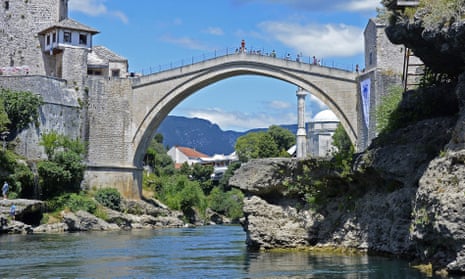The bridge in the middle of Mostar is the spiritual and social heart of the city. It’s where people meet and gossip, snatch a first kiss or dive into the waters of the river below. The Bosnian city takes its name from the arched Ottoman-era bridge and it became a terrible symbol for the shattering of Yugoslavia when it was destroyed by Croat paramilitaries in 1993, though it has since been rebuilt.
“It’s the soul of the town,” says Igor Memic, whose play Old Bridge, which won the Papatango prize for new writing last year, is now in rehearsals at the Bush theatre in London. Memic is from Mostar himself. His family came to the UK in 1992, “just 10 days before things popped off”. He doesn’t think of himself as a Bosnian playwright. Immigrant identity is more complex than that and his mother “left it up to me to discover who I was and who we were”.
Writing Old Bridge has formed part of that process. It’s a sprawling memory play about young people having their world upended by a war in which they had no say. They don’t see the conflict coming. They’re too busy living their lives, being teenagers.

“I always wanted to present the country that I come from, in the way that I understand,” says Memic. “Beautiful and diverse and joyous and rich. When I see depictions of where I come from in other stories, I don’t necessarily recognise it.” Mostar was a diverse city of Bosnian Muslims, Croats, Serbs, living alongside one another. “On one corner there’s the smell of Turkish coffee, on another you’re in Austro Hungary. There are Venetian influences, 20th-century communist influences. All this merging of cultures. I’ve never seen that anywhere else in the world I’ve been.”
The bridge “held the whole place together” and naturally plays a big part in the play – almost as a character in itself. What’s intentionally left absent is any reference to the politics, to the men in power who steered Yugoslavia on to the rocks. “You shouldn’t need to read a history book or an encyclopedia to watch the play,” Memic says. He didn’t write it to educate people, he wrote it for himself. “It’s a love story,” he says. “If someone is watching this play who has endured that conflict, or another conflict, they will have one experience and if someone has no idea what happened, they will have a different engagement with it.”

The play is being directed by Selma Dimitrijevic, who was born in Osijek and has lived in the UK since she was 26. While she thinks the play’s characters and attitudes will be familiar to people from the region – “even though they’re speaking English, they feel Bosnian” – there’s a universality to it. “It’s also a metaphor,” she says. “That’s what’s really exciting. It captures the moment when your life is disrupted and sent in a different direction. It could be a tsunami, 9/11, it could be Covid.”
Initially they considered casting actors from the former Yugoslav diaspora and saw a number of performers from those countries, but that process opened up questions of its own. Do you only cast Bosnian performers? Or from a wider eastern European pool? In the end they decided to adhere to Memic’s original stage direction and cast the play in a way that reflected the make-up of the city in which it was staged. The cast includes Saffron Coomber – from Tracy Beaker Returns – and Dino Kelly, the only cast member with a Bosnian connection.
While the events of the Yugoslav wars influenced British drama, most notably Sarah Kane’s Blasted, there have been notably few plays about the subject by people from the countries of the former Yugoslavia on British stages, the exception being Croatian playwright Tena Štivičić’s 3 Winters, staged by the National Theatre in 2014. I ask Memic whether he felt a sense of pressure when deciding to tackle this subject. “I felt most liberated as a writer when I decided to stop listening to the voices I’d conjured up, to silence them and say this is just me and the page. Let’s see what happens.”
When it was announced that Old Bridge had won the Papatango prize in July 2020, it was still relatively early in the pandemic. It’s taken some time to bring it to the stage, but even with the theatre industry in disarray, Papatango stuck with him, he tells me, using the time to develop the play. Now over a year on, he finally has the chance to sit in on rehearsals. “I didn’t need an Oyster card, I could have flown here, I had so much energy in me,” he laughs.
Though they’re still in the early stages of the rehearsal process, Dimitrijevic wonders how the pandemic might affect the way audiences relate to the play. After all, she says, “we’ve all lived through a time when the world stopped spinning.” Memic nods. That’s what the play’s about, the idea that “you never think it will happen to you, you never think it will happen here … and then it happens.”
Old Bridge is at the Bush theatre, London, 21 October-20 November.

Comments (…)
Sign in or create your Guardian account to join the discussion